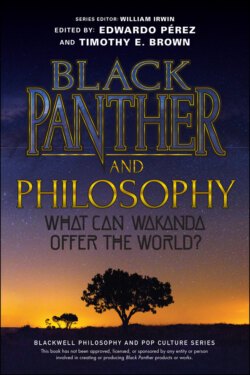Читать книгу Black Panther and Philosophy - Группа авторов - Страница 20
Justice and Reparation
ОглавлениеKillmonger’s deep-seated anger toward the Wakandan government didn’t arise out of nowhere. He’s angry because they treated him unjustly. In the film, they abandoned him in a foreign country after accidentally killing his father. In the comics, his motivations are more fluid – different writers portray him differently – but there’s one constant: he never picks Wakanda at random. His motherland always does him wrong.
Locke would say we’re now facing two questions of justice. Like Kant, he wrote on retributive justice, but Locke says there’s also a second brand of justice, reparatory justice (sometimes called rectificatory justice), which asks, if someone does you wrong, what do they owe you to make it right? Locke’s vision of justice was pretty radical in his day, because he thought monarchy was inherently unjust. Instead, he said we have certain natural rights – rights born into us by our very nature – which dictate that “no one ought to harm another in his life, health, liberty or possessions.”7 If you’re minding your own business and someone harms you in any of these categories, Locke says the offender owes you reparations.8
John Locke has a presence in the world of Black Panther. The Wakandan philosopher Changamire quotes him in the 12-issue run “A Nation Under Our Feet,” by Ta-Nehisi Coates and Brian Stelfreeze. There, a rebel group called The People, inspired by Changamire’s vision of a Wakanda ruled by its people instead of its monarch, rises up to overthrow the Black Panther once and for all. Their motto, “No One Man,” is Lockean at heart.9
For Coates, Wakanda is an allegory for the United States, and his questions of reparatory justice apply to both countries. Before he came to write for Marvel comics, Coates was a national correspondent for The Atlantic, where he made waves nationwide with his article, “The Case for Reparations.” There he asked a question that makes lots of Americans uncomfortable: what does the United States owe African Americans for the harm its policies have done to them?
It’s not an easy question to answer, in part because reparatory justice is tricky. Sometimes making reparations is easy, like paying someone’s bill from the body shop if you rear-end their car. Sometimes it’s difficult, like paying that bill when it costs as much as the vacation you’ve been saving up for all year. And sometimes it’s just plain impossible. For all its technological marvels, Wakanda can’t un-kill N’Jadaka’s father. (Maybe in Black Panther 2 T’Challa will borrow the Time Stone and go back in time to make things right. And hey, Marvel Studios, if that’s the way you decide to go with it, we want a cut.) The United States can’t un-exploit anyone, and even if it revoked every exploitative law on the books today, there are still millions of African Americans living with the everyday consequences of past exploitation.10
The trickiest part of reparatory justice is dealing with powerful people who owe reparations but can’t be forced to pay – or, for that matter, to even consider what payment might look like. As Coates observes, the US government has shown no interest in even raising the question of reparations: no president has ever asked for a study, and the House of Representatives has turned down every opportunity to study the question. It has done this regardless of which party was in power, and it’s done it 26 times in a row.11
In the film Black Panther, reparations are tricky for a different reason: Killmonger wronged Wakanda because Wakanda wronged him first. Had T’Chaka not orphaned and abandoned him, young N’Jadaka might never have become Killmonger. He might still have challenged T’Challa at Warrior Falls, as is every Wakandan citizen’s right, but he wouldn’t have had to murder anyone along the way. As he sees it, he’s taking by force the very thing Wakanda owes him anyway. But as the Wakandan government sees it, he’s setting the country on a course that can only end in violence and destruction. That’s no way to bring about justice.
However, what if there were a way to bring Killmonger and Wakanda to the table to discuss how to repair the damage done? What if that table included seats for everyone harmed by either party? In other words, instead of asking how to punish or how to repay debts, what if the question of justice were how to make things better for everyone involved?
